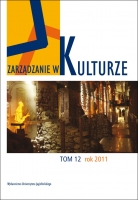"Dlaczego tak trudno nas zrozumieć?" Romowie w polskim dyskursie publicznym
"WHY IS IT SO DIFFICULT TO UNDERSTAND US?" THE ROMA IN THE PUBLIC DISCOURSE IN POLAND
Author(s): Anna LubeckaSubject(s): Cultural Essay, Political Essay, Societal Essay
Published by: Wydawnictwo Uniwersytetu Jagiellońskiego
Keywords: Rom; public discourse; stigma; exclusion; alienation; otherness
Summary/Abstract: Although the Roma have been living on the territory of Poland for nearly five centuries and today their number is between 20–30 thousand they are still perceived as strangers. Their stigma of strangeness and otherness has a double dimension because, on the one hand, they have not become fully integrated with the Polish society of gadzie. On the other, they appear as strangers to their own compatriots from other clans because two big groups inhabit Poland – the more numerous the Poland Roma or the Plain Roma and Bergitka Roma or the Mountain Roma who are a group of only three thousand people. Both external and internal divisions, which create all kinds of familiarity/strangeness borders and contribute to a special cultural semantics of the term Roma do not facilitate a dialogue between the Roma and the gadzie and the Roma and Roma. Why is it so diffi cult to understand a Roma, why is it hardly possible to break the stigma, stereotypes and prejudice despite the long years of co-existence on the same territory? Why can one observe but a slow, hardly visible change in the Polish-Roma relationships which are still defi ned as lacking tolerance, mutual understanding, trust and respect? There are many reasons which account for such a state of affairs. Firstly, it is history, both shared and working as a factor of social exclusion, then the Roma culture and its different and conservative system of values underlying their ethos and life style. Finally, economic and educational factors are also to be considered as the Roma belong to the least educated members in the Polish society and consequently the least economically privileged occupying the lowest position in it. The fact that they have always functioned in family-clan structures results in their not having developed a strong concept of identity other than family-oriented and local. Most of them are also unable to take part in the public identity discourse following its rules established by gadzie. All the above factors account for the Roma either participating in it in the role assigned to them by the non-Roma or being absent from it.
Journal: Zarządzanie w kulturze
- Issue Year: 2011
- Issue No: 12
- Page Range: 251-269
- Page Count: 19
- Language: Polish

